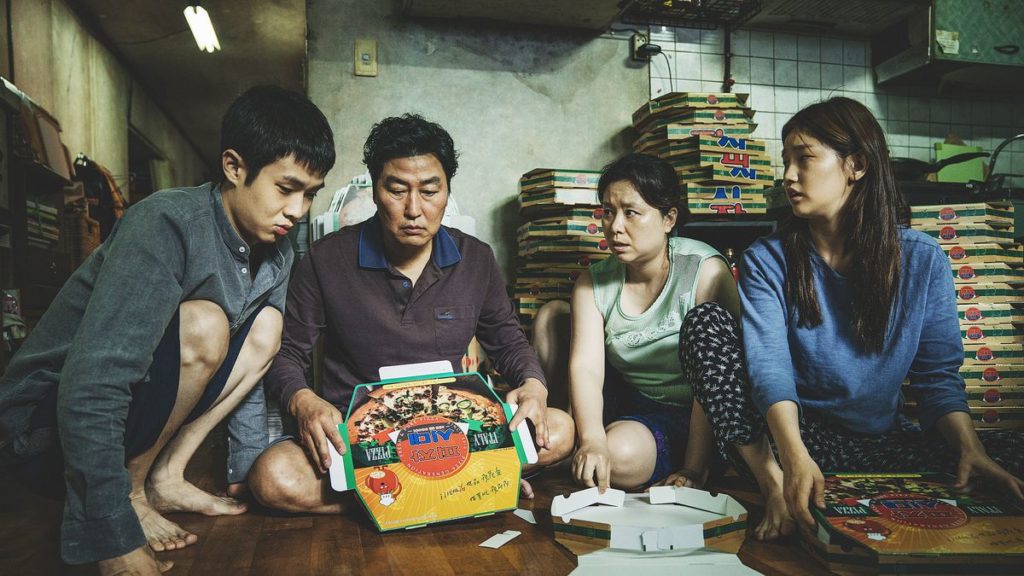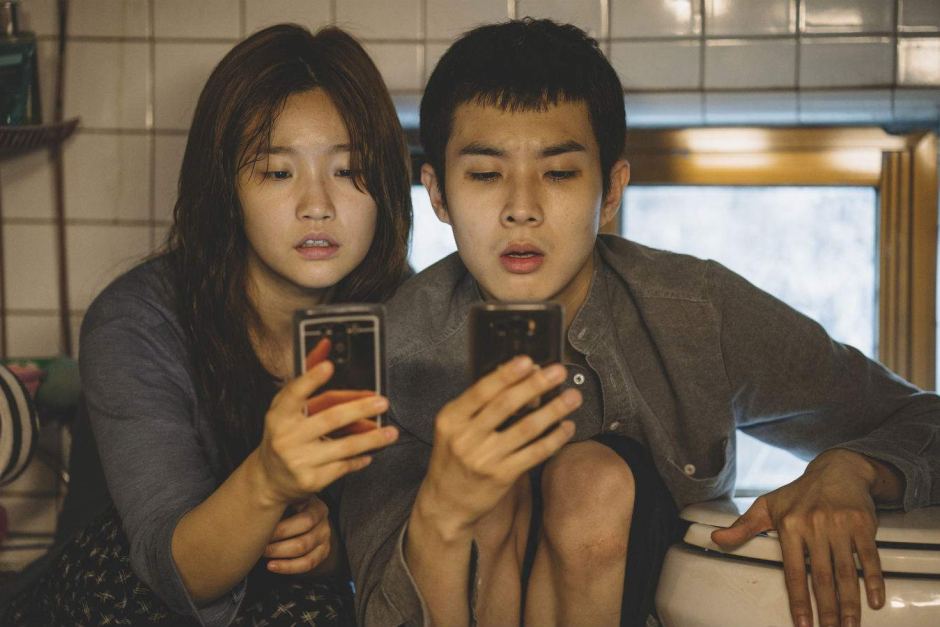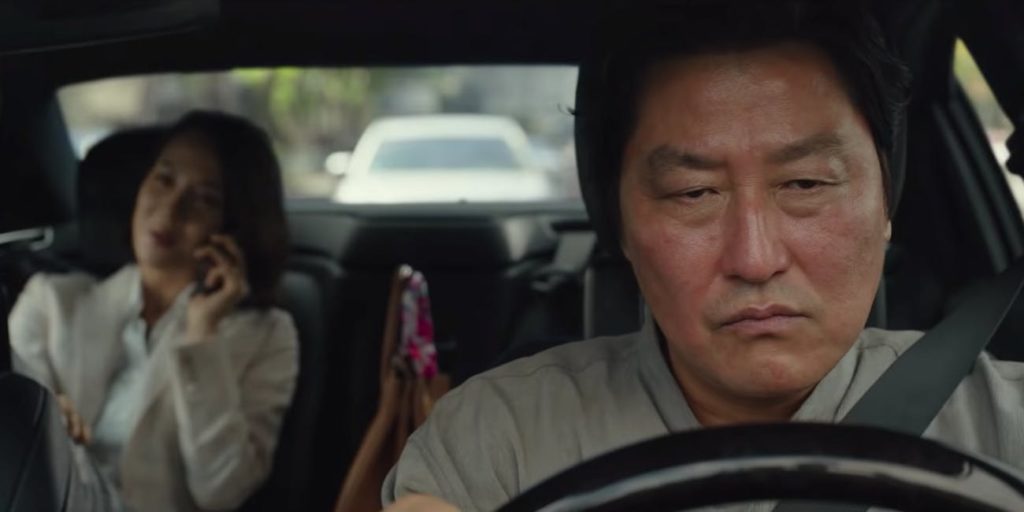
The underground is both a geographic location and a lowly caste in Parasite, the electrifying new movie from Bong Joon-ho. In this tonally shifting and artistically unwavering film—it’s part comedy, part thriller, all silky craft—the social order is upended with mayhem and precision, as the dwellers of the subterrane invade the castles of the aristocracy. Yet Parasite’s ravishing, blood-soaked imagery is complemented by its patience, its humor, and its observational savvy. Consider that it largely transpires in two different homes, whose contrasting layouts illuminate a crucial truth: that some basements are more equal than others.
The film’s title suggests an infestation, though Bong, who also wrote the screenplay with Han Jin-won, plays it coy, leaving open to interpretation just who’s the scourge and who’s the plagued. What’s obvious from the jump, however, is that Parasite is a movie about class. This is nothing new for Bong; in Snowpiercer, he imagined a giant train that separated its inhabitants according to their inherent station, a rigid hierarchy enforced by Tilda Swinton, who brutally reminded the steerage occupants of their lesser status with a chillingly didactic fable featuring the edict, “Be the shoe.” The stratification in Parasite may not be as linear, but it’s still firmly in place, visible to the eye and—as becomes at first amusingly and then grotesquely clear—detectable to the nose.
But Bong hasn’t made a mere polemic, even if he has plenty to say. He’s also constructed a sleek and supple picture, one crammed with jarring surprises and sudden swerves but unified by exacting technique. Like his compatriot Park Chan-wook, Bong has a knack for delivering pulpy material with art-house finesse, and Parasite is visually arresting without being especially show-offy. His camera, operated by Burning cinematographer Hong Kyung-pyo, is fluid but controlled; he holds shots for extended periods and often peers around corners or under tables, a meticulous aesthetic that somehow never calls attention to itself. His editing is tidy and punchy, combining a veteran poise with a youthful sense of mischief. It’s easy to bask in the film’s shimmering surfaces and sharp angles, especially once you arrive at the Park family mansion, an impossibly handsome estate where every art-deco staircase seems to have been gilded for maximum gleam.

When Parasite begins, however, its environs are decidedly less opulent. The movie opens on the Kims, a cheerful nuclear unit living in a subbasement in Seoul. To call their domicile cramped is to offer a kindness; their toilet is nestled on a ledge that juts out halfway up the wall, as though it were the bathroom on Being John Malkovich’s seventh-and-a-half floor. Cockroaches roam along the dirty floor, so when exterminators prowl the streets, the Kims’ patriarch, Ki-taek (Bong regular Song Kang-ho), insists on leaving the windows open, more than willing to inhale toxic fumes in exchange for free pest control.
Yet Parasite is not some pealing lament of wretched destitution. Bong presents the Kims’ poverty matter-of-factly, and as characters, they’re neither pitiable nor pitying; they are instead smart, playful, and even enterprising, collectively performing humiliating gigs on TaskRabbit with minimal fuss. Their canny commercial instincts kick the plot into gear when family friend Min (Park Seo-joon) announces that he’s leaving town and encourages the Kims’ teenage son, Ki-woo (Choi Woo-sik), to replace him as the English tutor for a rich high school sophomore. One fake diploma and a handful of expertly timed compliments later, and Ki-woo is securely employed with the Parks, teaching a handful of banal phrases to the smitten Da-hye (Jung Ziso) and graciously accepting envelopes stuffed with cash from her mother, Yeon-kyo (a wonderful Jo Yeo-jeong). Now if only he could recommend an art instructor for Da-hye’s younger brother…

For its first hour or so, Parasite glides along as a sly, cutting satire of the rich and shameless. Yeon-kyo may be erudite and wealthy, but she’s also earnest and gullible, and Ki-woo effortlessly leverages her cluelessness to his family’s benefit. Before long, thanks to some quick thinking and the power of the personal reference, all of Ki-woo’s relatives are masquerading as disconnected service workers who land cushy jobs in the Park household: Ki-taek as a driver, mother Chung-sook (Jang Hye-jin) as a housekeeper, and sister Ki-jung (Park So-dam) as that aforementioned art teacher. Bong chronicles this process of infiltration with a marvelous mix of arch humor and cinematic energy. The sequence in which the Kims conspire to besmirch the Parks’ beloved maid (Lee Jeong-eun)—which paves the way for Chung-sook to usurp the position, and which culminates with an ingenious use of hot sauce—unfolds with the rhythm and panache of a musical number, eliciting your admiration and demanding your applause.
Had it remained on this funny and entertaining track throughout, Parasite might have risked dulling the power of its allegory through repetition and exaggeration. Yet Bong evades that trap, partly thanks to nimble variety; each of the Kims manipulates Yeon-kyo through a careful blending of flattery and force, but each applies the technique differently, as though adjusting their temperament along a sliding scale. Ki-woo is a born suck-up, reinforcing Yeon-kyo’s superiority with honeyed obsequiousness. Ki-jung is more assertive, impressing her meek new boss with her authoritative demeanor. For his part, Ki-taek relies on folksy charm, striking up a masculine bond with Yeon-kyo’s husband, Dong-ik (Lee Sun-kyun), while always studiously remaining in his proper place as a social and intellectual inferior.
To this point, you might wonder if Yeon-kyo is a caricature—the dense, empty-headed heiress with no real-world intelligence. But Jo’s performance is too dexterous to make her flighty housewife a figure of pure mockery, and besides, Bong doesn’t paint with so broad a brush. He instead shades his characters, blemishing his heroes and humanizing his villains. And so, you’re already questioning your assumptions and recalibrating your sympathies when Parasite arrives at its rough midpoint, at which time it transforms into a different movie entirely.

I can scarcely reveal how or why. What I can say is that in its second half, Parasite adopts the texture of a thriller while also, even more bravely, acquiring the weight of a tragedy. There are a number of exhilarating set pieces—duck behind the couch! look under the bed!—which Bong executes with masterful flair. The Parks’ home, which once felt so vibrant and modern, becomes a realm of chaos and danger, a cruel battleground for the settling of bitter feuds. A bunker, which we learn was designed for residents to hide from either soldiers or (get this) creditors, alternates between a refuge and a war zone. Green grass gets stained red.
It’s all ferociously compelling, but what makes Parasite special is how smoothly it tethers its genre shocks to its restless social consciousness. It’s a film about upheaval, but its spirit of revolution doesn’t feel cleansing or cathartic; it’s too honest for that. In illustrating the rigidity of the class system so boldly, Bong has made a picture that seethes with resentment yet doesn’t provide any easy targets or false platitudes. And in telling a human story with finely drawn, heavily flawed characters, he has made the political personal.
During a crucial late scene, Dong-ik pointedly reminds Ki-taek, “You’re getting paid extra,” a stinging rebuke that carries with it the unmistakable assertion of supremacy—the recognition that money is a proxy for power, an invisible wall which divides the rulers from the ruled. Bong even has the nerve to literalize his metaphors, giving the Kims an actual odor of indigence, one that causes the Parks to wearily wrinkle their noses. It’s both funny and sad, but cinematically speaking, it functions as a different kind of symbol. Watching this movie, you can practically smell its greatness.
Grade: A
Jeremy Beck is the editor-in-chief of MovieManifesto. He watches more movies and television than he probably should.
